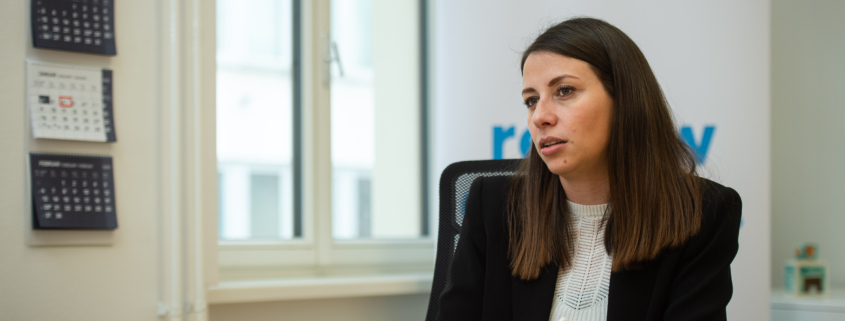In the last issue of the Pen supplement of the weekly Vestnik last year, MEP Irena Joveva shared her views on the current situation of the Slovenian language in public use and discussed the possibilities for improvement. Joveva, who was among the first to warn and call for an end to discrimination against the Slovenian language by some streaming content providers on the Slovenian market, emphasized: “Respect for linguistic diversity is truly a minimum requirement that should be self-evident even without legislative coercion, but it is clear that it will not be possible otherwise.”
In this regard, the MEP wrote to the CEOs of Amazon Prime, Disney+ and Netflix in 2022, and warned of linguistic discrimination and violations of Slovenian legislation at one of the plenary sessions of the European Parliament. Although she met with representatives of most companies, Joveva reminded the journalist that none of them had shown motivation to solve the problems related to the non-use of one of the official languages of the European Union, even though they are doing very well on the Union market.
“The statements, which implied, among other things, that it was not financially worthwhile for them, were unacceptable. I myself made it clear to them that I would continue to seek a solution in other ways, as it was more than obvious that the problem would have to be solved through legislative measures.”
When asked about the results of her efforts, the MEP replied that without a legally binding ban on language discrimination in the European Union market, including the digital one, we cannot expect consistent respect for the linguistic diversity of these companies.
Meanwhile, she also pointed out that the conversation with Apple representatives was somewhat more productive, but still insufficient. She therefore announced a new meeting with Apple representatives, where they will review the current situation and discuss further steps.
“Until there is a legally binding ban, instead of respecting languages and non-discrimination at any level, including linguistic, these companies will always say that they simply don’t have to do it, or they will solve the problem slowly.”
The MEP has also been actively involved in resolving issues within her remit in the European Parliament. As one of the parliamentary negotiators on behalf of her Renew Europe political group in the Committee on Culture and Education, she participated in drafting the text of the Digital Services Act, which entered into force in August last year. The legislative provision obliges online giants to take into account the language of the Member State and to employ moderators who can communicate in that country’s language.
The upcoming media freedom act, which is expected to be finally approved in the coming weeks, is also crucial for the MP. The text of the act also includes changes in the area of language discrimination and allows for cooperation between national regulators. This is extremely important for the MP, as streaming content providers often make excuses by stating that they are not based in Slovenia.
“We want to regulate this with two articles on the coordination of national regulators in the European Media Freedom Act, but for successful implementation and systemic resolution of the issue, we will also have to amend the Audiovisual Media Services Directive.”
Although the existing Audiovisual Media Services Directive already requires compliance with the principle of non-discrimination in commercial communications on grounds of sex, ethnicity, religion, age or sexual orientation, Joveva explained that the already enshrined principle of non-discrimination should also be extended to prohibit linguistic discrimination.
In order to achieve these goals, the MEP, in a public appeal to the European Commission, highlighted the importance of including an explicit prohibition of linguistic discrimination in this directive, and discussions on implementing this amendment are already in full swing.
”At a time when the Internet is an increasingly important part of our lives, we must all work together to ensure the equality of all languages in the European Union, as this is essential for their survival and continued existence, including Slovenian. The legislative process in the Union is usually long-lasting, but this does not mean that we can sit idly by and wait forever for multinationals, who will not do much without concrete pressure, especially legislative pressure.”
text by Maja Hajdinjak
Published in Vestnik: 28.12.2023
Photo: Anže Petkovšek




Leave a Reply
Want to join the discussion?Feel free to contribute!